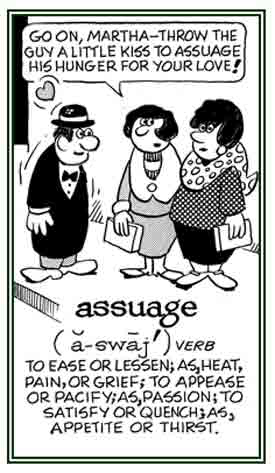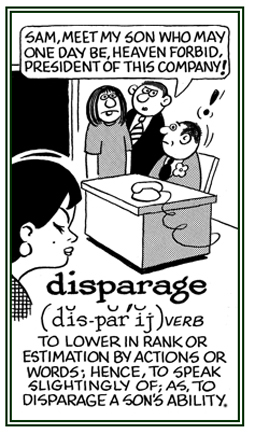acreage
(s) (noun), acreages
(pl)
The size of land measured in acres: Virginia's parents had a house on a large piece of acreage in a town in Southern California.
amperage
(s) (noun), mperages
(pl)
The strength of an electric current shown or measured in amperes: Amperage can be explained as the power of a current of electricity which is generated by a machine and is assessed in ampères.
anecdotage
(s) (noun), anecdotages
(pl)
Anecdotes considered as a group: Jane's parents gave her a wonderful book full of anecdotage and great illustrations.
appendage
(s) (noun), appendages
(pl)
1. A body part or organ that projects from the main part of the body: An appendage can be an arm, a leg, a tail, a wing, or a fin, any of which is joined to the axis or trunk of a body.
2. That which is fastened to something else: An appendage can be a small, or a secondary, attachment, like a thorn on a rosebush.
arbitrage
(s) (noun), arbitrages
(pl)
The simultaneous buying and selling of securities, currency, or commodities in different business markets: An arbitrage is used for trading derivative forms (customized contracts transacted outside of security exchanges) in one market for the immediate resale in another market in order to profit from unequal prices or the differences in prices of the two places.
assuage
(verb), assuages; assuaged; assuaging
1. To attempt to make a situation less painful or severe, such as an unpleasant feeling or pain: During the economic crisis, Ted tried to
assuage the investor's fears with guarantees that his company was still doing well.
2. Etymology: essentially from Latin
as, "to" (a variant of
ad) before
s +
suavis, "sweet, agreeable".

 © ALL rights are reserved.
© ALL rights are reserved.
Go to this Word A Day Revisited Index
so you can see more of Mickey Bach's cartoons.
assuagement
(s) (noun), assuagements
(pl)
A feeling that results when something troublesome is eliminated or is lessened; alleviation; relief: It came as a total assuagement when Dr. Smith told Mrs. Thompson that she didn't have cancer at all!
assuager
(s) (noun), assuagers
(pl)
Something or someone that decreases, mitigates, or relieves pain, emotional situations, hunger, or some other unpleasant physical or mental condition: When each of the workers on the farm came in for dinner, they were all very thankful for their assuager who prepared such delicious meals for their ravenous bellies!
beverage
(s) (noun), beverages
(pl)
1. Any potable (drinkable) liquid, especially one other than water, as tea, coffee, beer, or milk: The price of the meal includes a beverage, but not wine or liquor.
2. Entymology: from Anglo-French beverage, from Old French bevre, "to drink" from Latin bibere, "to imbibe".
carnage
(s) (noun), carnages
(pl)
1. Widespread and indiscriminate slaughter or massacre: Wars cost a vast amount of savagery,
carnage, and suffering, especially of human beings.
Carnage can also relate to the serious injury to a great multitude of people, as in a major accident.
The slaughter of a great number of people, such as in battle, or the butchery or massacre of a huge number of people, causes carnage with resulting corpses, gore, etc.
2. Etymology: from Old French carnage, from Old Italian carnaggio, "slaughter, murder"; from Medieval Latin carnaticum, "flesh, meat", from Latin carnem or carn-, "flesh".
courage
(s) (noun), courage
(pl)
1. The ability to be self-assured and sure of oneself: It took Jim a lot of
courage, to be efficient and successful in his job.
2. The capacity to overcome one's panic or fright: Jill had to pluck up a lot of
courage to tell her boyfriend that she didn't love him after all.
It took Jim a lot of courage to jump into the very cold water.
3. The quality of keeping one's determination or objective: After becoming blind, Lynn kept up her courage and tried to arrange her life as it was before and continued going by bus into town, doing her shopping, etc.
discourage
(verb), discourages; discouraged; discouraged
1. To prevent, to dishearten, to crush: The fact that his birthday cake wasn't baked yet discouraged Jack a lot until his mother told him not to worry because it would be finished in time for the party.
2. To persuade another person not to do something: Sam tried to discourage his little brother from taking part in the swimming competition in their school.
disparage
(verb), disparages; disparaged; disparaging
1. To speak disapprovingly or contemptuously to someone or something: When Sara was given less pay as a secretary, she
disparaged her boss as an idiot who didn't deserve to be a supervisor.
2. To talk about anyone or anything in a disrespectful way; to belittle or "to put down": Sally's administrator was
disparaging her as inefficient and unqualified and that she was lucky that he didn't fire her.
 © ALL rights are reserved.
© ALL rights are reserved.
 © ALL rights are reserved.
© ALL rights are reserved.
Go to this Word A Day Revisited Index
so you can see more of Mickey Bach's cartoons.
dosage
(s) (noun), dosages
(pl)
1. The amount of a therapeutic medication, or other substance, that is administered in a prescribed and measured amount at any one time: The
dosage was clearly indicated on the label of the medicine bottle.
2. In winemaking terminology, the addition of sugar to specific wines: The wine taster determined that a slight
dosage of sugar would be appropriate to add to the wine before corking.
3. Etymology: from Middle French (about 1400-1600)
dose, from Late Latin
dosis which came from Greek
dosis, "a portion prescribed"; literally, "a giving".
Used by Galen and other Greek physicians to mean "an amount of medicine", from Greek didonai, "to give".
encourage
(verb), encourages; encouraged; encouraging
1. To motivate, to inspire, to urge: The fitness trainer encouraged Mary to concentrate on her leg movements.
2. To prompt, to strongly advocate: The town's government encouraged people to leave their cars at home and go by bus when shopping.
3. To give aid or support, to help bring about: The parents of the students in school encouraged the idea of having new sports equipment and decided to donate money for this purpose.





